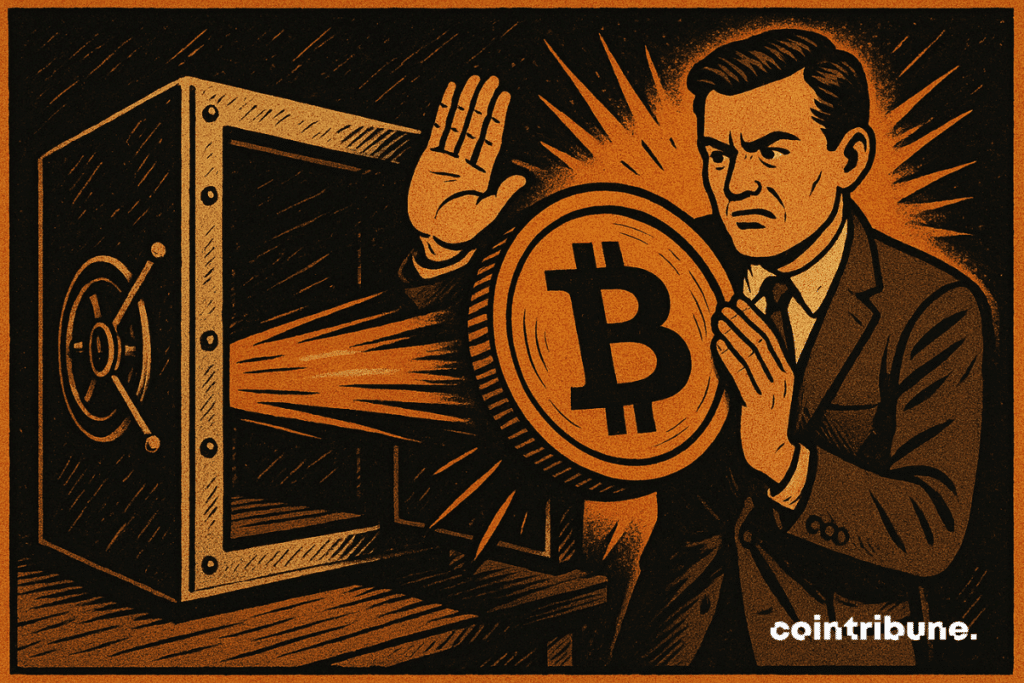Swiss National Bank Shuts Door on Bitcoin—Central Banks Still Fear the Orange Coin
In a move that surprises exactly no one in crypto circles, the Swiss National Bank (SNB) has reaffirmed its cold shoulder to Bitcoin. No BTC reserves—just good old-fashioned fiat and gold for this institution. Guess they’re waiting for a ‘regulated’ ETF wrapper before touching digital gold.
Tradition over disruption
The SNB’s stance mirrors the cautious—some would say outdated—playbook of most central banks. While private banks and hedge funds pile into crypto, the guardians of monetary policy cling to their 20th-century toolkit. Volatility? Too risky. Decentralization? Too unpredictable. Meanwhile, inflation quietly nibbles at their bond portfolios.
A cynical footnote
Funny how the same institutions that print money at will suddenly develop risk aversion when confronted with an asset they can’t control. Maybe next time they’ll reconsider—right after their next emergency liquidity injection.

In Brief
- The Swiss National Bank (SNB) reaffirms its refusal to include bitcoin among its official reserves, despite the global rise of cryptos.
- President Martin Schlegel justifies this rejection by citing bitcoin’s high volatility and lack of liquidity, incompatible with SNB’s stability requirements.
- A citizen initiative led by pro-bitcoin activists aims to amend the Swiss Constitution to impose bitcoin integration into national reserves.
- The debate raises questions about the future of cryptos in central banks’ strategies and the balance between direct democracy and monetary independence.
Stability Above All: Why Does the SNB Refuse to Integrate Bitcoin?
During the annual general meeting held in Bern on Friday, April 25, 2025, Martin Schlegel, President of the Swiss National Bank (SNB), categorically rejected the idea of including bitcoin among reserve assets.
He stated before shareholders:
Crypto currently cannot meet the requirements for our monetary reserves.
Schlegel emphasized that SNB assets must meet strict criteria, including high market liquidity and value stability—qualities bitcoin is currently unable to provide in its current state of development.
BTCUSDT chart by TradingViewBy adhering to these criteria, the SNB aims to guarantee the rapid availability of its resources, essential for market interventions or supporting the Swiss franc during periods of volatility.
Specifically, the SNB identifies several weaknesses that exclude bitcoin from its reserve options:
- Lack of sufficient liquidity: bitcoin trading volumes are considered too low to ensure quick sales without major price impact
- Extreme volatility: bitcoin’s significant fluctuations do not allow for reliable preservation of reserve value
- Strategic inadequacy: the SNB must have assets mobilizable without delay in crisis situations, a condition difficult to fulfill with cryptos.
By maintaining this policy, the Swiss central bank asserts its top priority: preserving the stability and resilience of the national financial system, even in the face of new global economic dynamics.
A Pro-Bitcoin Referendum Shaking the Institutional Status Quo
Opposite to the SNB’s caution, a citizen initiative seeks to shake the legal foundations of national reserve management. Led by Luzius Meisser, an entrepreneur and ardent bitcoin supporter, a movement aims to force the Swiss National Bank to diversify its assets by integrating bitcoin alongside gold.
Additionally, according to Meisser, “bitcoin represents a special asset in a multipolar world where trust in public debts is gradually collapsing.” This initiative intends to organize a national referendum to amend the Constitution, thus giving a political dimension to this economic debate.
The Swiss legislative process, based on direct democracy, allows citizens to propose such constitutional amendments, provided they gather a sufficient number of signatures. If the initiative reaches this threshold, a national vote could then compel the SNB to review its asset management principles.
This prospect raises questions about a central bank’s ability to maintain its neutrality and operational flexibility while responding to specific popular demands.
If the bitcoin campaign managed to mobilize a significant portion of the Swiss population, it could create an unprecedented precedent in the history of modern central banks. However, even in case of success, the road would be long before effective implementation, considering the necessary legal, regulatory, and technical adjustments. In a world where trust in traditional currencies is wavering, the debate around bitcoin in sovereign reserves could mark a fundamental evolution of central banks’ role vis-à-vis cryptos.
Maximize your Cointribune experience with our "Read to Earn" program! For every article you read, earn points and access exclusive rewards. Sign up now and start earning benefits.

